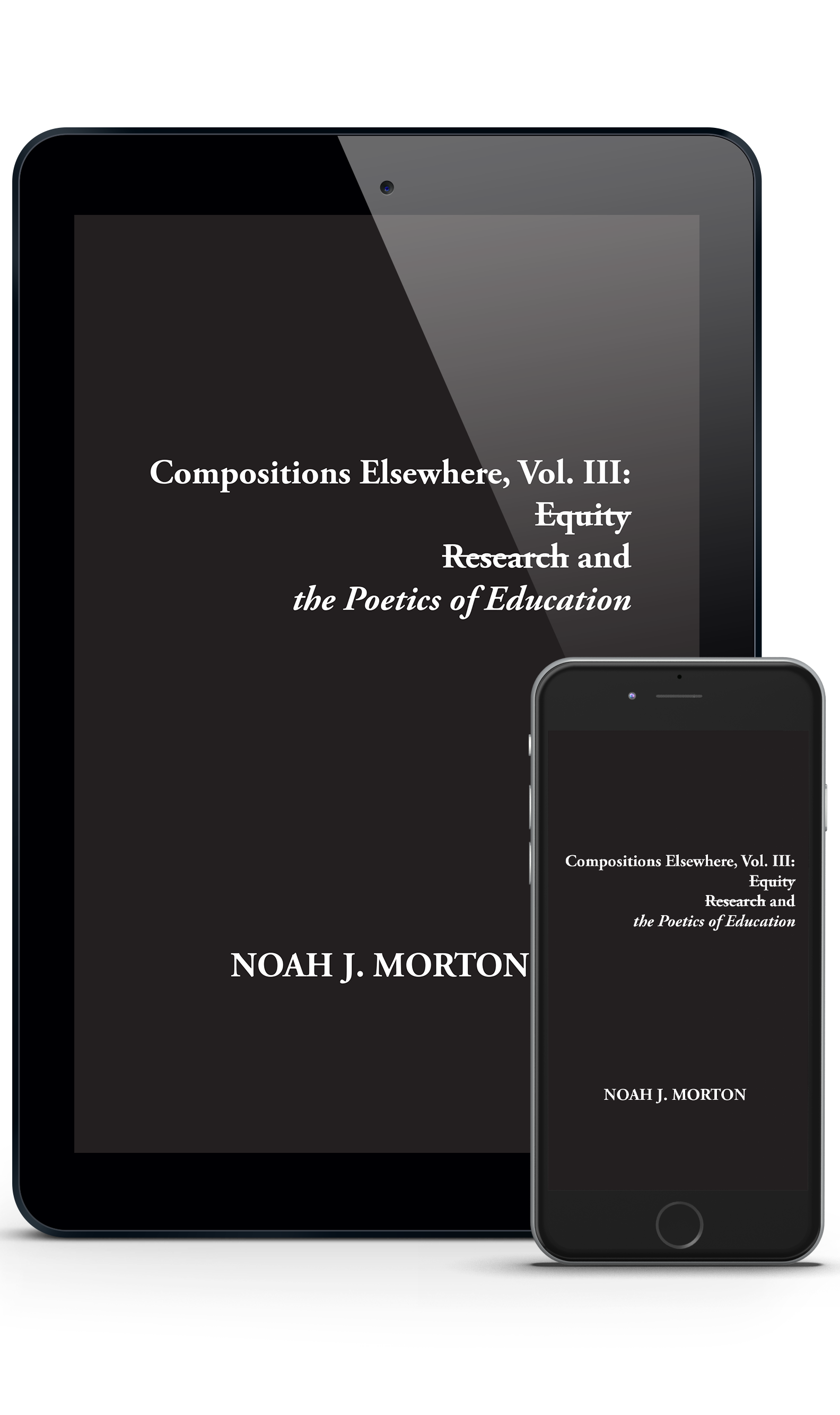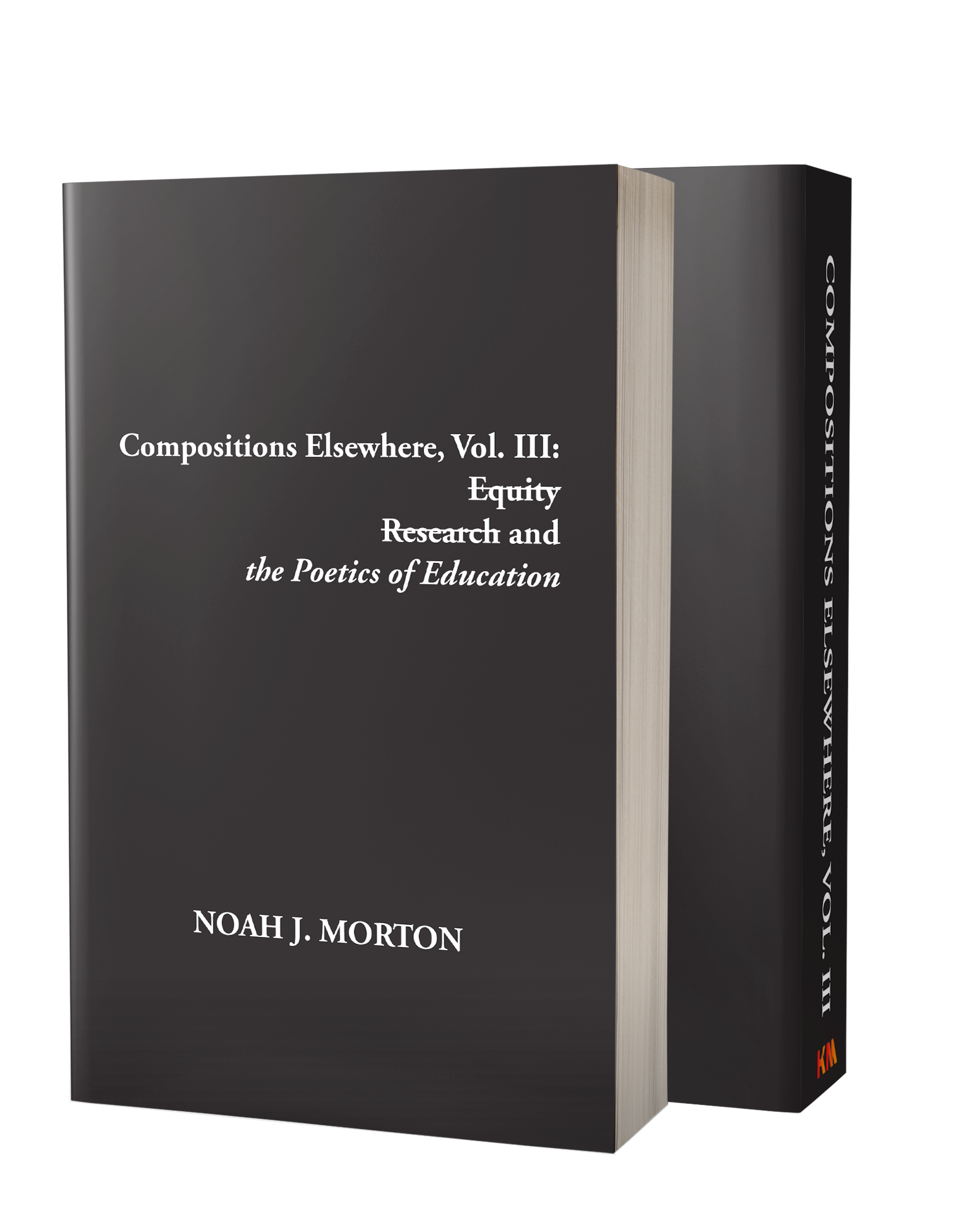Kulshi Mumkin®, LLC
- Projext Archive --->
- noahmorton
Compositions Elsewhere, Vol. III: Equity, Research, and the Poetics of Education
4 Parts (each essay has additional sections as well as illustrations/exhibitions) | ~48,000 words | 191 pages | 5.5" x 8.5" |
Open Access (and/or $20 suggested contribution)
This is a trilogy of compositions critically interrogating equity, research, and knowledge within education spaces. The poetics in education
involves the lived experiences of people. Its focus is to recognize the intricacies of humanity present within each person as well as to facilitate a
stimulating learning environment to bring out that uniqueness. This uniqueness of a shared humanity resonates as the past liberation struggles continue to inform
the resistance. Thus, the poetics of education is a critical pursuit to recognize the relationships and resonances among the lived experiences, which illuminate
the possibilities of education as the instrument of liberation.
The poetics of education observes the limitation of disciplines and the reproduction of dominate ways of thinking through academic criteria to express the intricacies
of lived experiences. Questions arise on how art provides a critical gaze to observe what was taught not to see through making the familiar, strange and
strange, familiar to reimagine education as the instrument of liberation. Lived experiences are shared and the exhibits are curated to continue the conversation.
The solution is not singular for mixing is a plural process.
TRACKLIST (Outline)
ACKNOWLEDGEUnderstanding education through liberatory pedagogy
I. Introduction: "Only In Theaters"
II. Colonial Masks: Education and Equity
III. Private and Public Good: An Economic Good
IV. (Con)fusion in Conceptualizing Education
V. Last Question: What is Education?
VI. Lift Every Voice: The Instrument of Education
Acknowledge
Endnotes
References
Counter-Narratives Reflecting on Reseach Epistemologies
Queue
Reflection of the Other: A Fable
Thinking of Essay 2: A Counter-Narrative
Preliminary Question: What is Research?
Quantitative and Qualitative: A Research Binary
Decolonizing Research Methods in a WhatsApp Message
Re-search and Epistemic Disobedience
Grade Matrix and Knowledge Production
Decolonizing Research Methodologies 101
Dribbling a Basketball: Who decides West in a sphere?
Cambridge Ethics and the Fast Snail
When research goes too far…
The Research Ethical Pillars: Alternative Route
Delinking the Research Web
Appendix is Bursting
References
POETICS OF EDUCATION
Education as an Instrument of Liberation
Education as Distraction and Domination
The First Key: Refusal
Call and Response
Listening to Song: Social World of The Text
18 March: Update from the Vice-Chancellor
Further Consideration: Who is the bull, fighting?
The Arena as the Commons: Melody of the Undercommons Elaborated
"Orders of Operation:" A Lesson on PEMDAS
Exhibit F — What do you see? What are you defending
Exhibit T — "Research" Ballistics
Exhibit W — "Celestial" Cannon
Exhibit B — Cracked Coat of Arms
Exhibit A — A Game's Motto
Closing: A Declaration on the Point of Departure
References
Kulshi Mumkin®, LLC Open Access Statement – Please Read
This book is open access. This work is not simply an electronic book; it is the open access version of a work that exists in a number of
forms, the traditional printed form being one of them.
Most Kulshi Mumkin®, LLC publications are placed for free, in their entirety, on the web. This is because the free and autonomous sharing
of knowledges and experiences is important, especially at a time when the restructuring and increased centralization of book distribution as well
as academic ivory tower of paywalls makes it difficult (and expensive) to distribute radical texts effectively. The free posting of these texts does not
mean that the necessary energy and labor to produce them is no longer there. One can think of buying physical copies not as the purchase of
commodities, but as a form of support or solidarity for an approach to knowledge production and engaged research (particularly when
purchasing directly from the publisher).
The open access nature of this publication means that you can:
- read and store this document free of charge
- distribute it for personal use free of charge
- print sections of the work for personal use
- read or perform parts of the work in a context where no financial transactions take place
- gain financially from the work
- sell the work or seek monies in relation to the distribution of the work
- use the work in any commercial activity of any kind
- profit a third party indirectly via use or distribution of the work
- distribute in or through a commercial body
Support Kulshi Mumkin®, LLC/ Purchasing Books The PDF you are reading is an electronic version of a physical book that can be purchased through Kulshi Mumkin®, LLC directly. Please support this open access publication by requesting that your university or local library purchase a physical printed copy of this book, or by purchasing a copy yourself.
If you have any questions please contact the publisher: [email protected]
***adapted/cited from Minor Compositions
Digital Version

PDFs will be immediately available for download after checkout,
and an email will also include the download link. All orders are
delivered via Payhip, and purchasing details are processed through
our own Stripe account.
Print Version

Please note: We currently do not carry any stock. If you want a print edition, you can support this publication by
purchasing and/or requesting your local library/university to purchase print copies for community edition. The cost will be
determined mainly by print and shipping expenses. Please note, due to the price of printing, we only offer print for bulk
purchases (min 25 copies), which can be shared in community. Please contact us if interested.